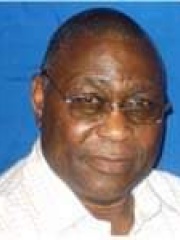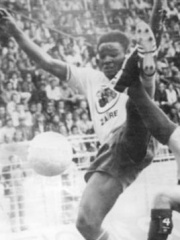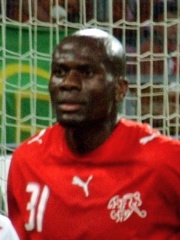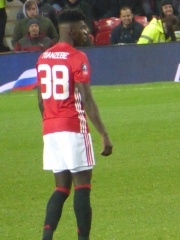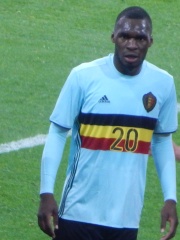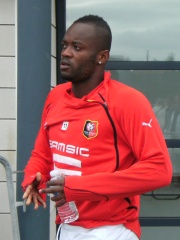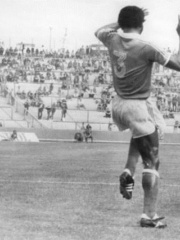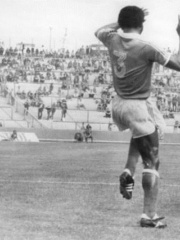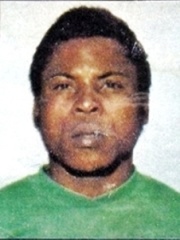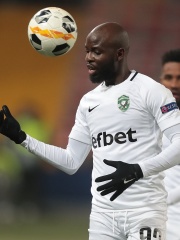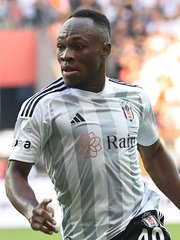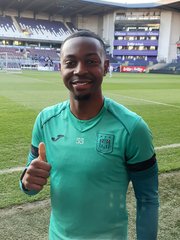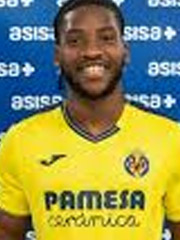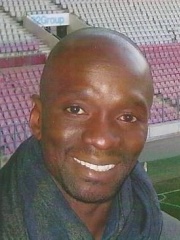




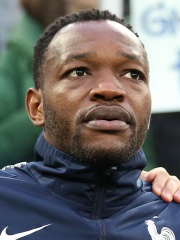

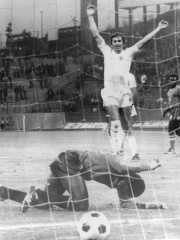
The Most Famous
SOCCER PLAYERS from Democratic Republic of the Congo
This page contains a list of the greatest Congolese Soccer Players. The pantheon dataset contains 21,273 Soccer Players, 72 of which were born in Democratic Republic of the Congo. This makes Democratic Republic of the Congo the birth place of the 58th most number of Soccer Players behind Ireland, and China.
Top 10
The following people are considered by Pantheon to be the top 10 most legendary Congolese Soccer Players of all time. This list of famous Congolese Soccer Players is sorted by HPI (Historical Popularity Index), a metric that aggregates information on a biography's online popularity. Visit the rankings page to view the entire list of Congolese Soccer Players.

1. Claude Makélélé (b. 1973)
With an HPI of 68.04, Claude Makélélé is the most famous Congolese Soccer Player. His biography has been translated into 56 different languages on wikipedia.
Claude Makélélé Sinda (French pronunciation: [klod makele'le]; born 18 February 1973) is a French football manager and former professional player who played as a defensive midfielder. He last managed Super League Greece club Asteras Tripolis. Regarded as one of the greatest defensive midfielders of all time, Makélélé has been credited with redefining the defensive midfield role in English football, especially during the 2004–05 FA Premier League season, where he played a key role in helping Chelsea win the title with 95 points. In homage, the defensive midfield position is sometimes colloquially known as the "Makélélé Role". In his playing career, which ended at Paris Saint-Germain, Makélélé also played for Nantes, Marseille, Celta Vigo, Real Madrid and Chelsea. He won league titles in France, Spain and England, as well as the 2001–02 UEFA Champions League during his time with Real Madrid. Furthermore, Makélélé was once selected in the FIFPRO Men's World 11 while playing for Chelsea. Born in Zaire, Makélélé was a French international for 13 years and was part of the France national team which reached the final of the 2006 FIFA World Cup. He also represented his nation at the 2002 FIFA World Cup, two UEFA European Championships and the 1996 Summer Olympics. After retiring from playing, Makélélé went into coaching and technical staff roles. He has been manager at Bastia, Eupen and Rangers Football Club ; assistant manager at Paris Saint-Germain and Swansea; a youth coach and technical mentor at Chelsea; and technical director at Monaco.

2. Kembo Uba Kembo (1947 - 2007)
With an HPI of 59.38, Kembo Uba Kembo is the 2nd most famous Congolese Soccer Player. His biography has been translated into 16 different languages.
Jean Kembo Uba-Kembo (27 December 1947 – 26 March 2007) was a Congolese football midfielder who played for Zaire in the 1974 FIFA World Cup. Born in Matete, Kembo played club football for AS Vita Club He made several appearances for Zaire, including appearances at the 1968 and 1974 African Cup of Nations finals. Kembo scored two goals in the decisive qualifier versus Morocco in a 3–0 win that clinched Zaire's place in the 1974 World Cup. Kembo's son, Jirès Kembo Ekoko, was a professional footballer who played for Rennes.

3. Roger Lukaku (1967 - 2025)
With an HPI of 58.15, Roger Lukaku is the 3rd most famous Congolese Soccer Player. His biography has been translated into 17 different languages.
Roger Menama Lukaku (6 June 1967 – 28 September 2025) was a Congolese footballer who played as a forward. Throughout his career, he played for KV Oostende, KV Mechelen and Germinal Ekeren. He is the father of footballers Romelu Lukaku and Jordan Lukaku.

4. Ndaye Mulamba (1948 - 2019)
With an HPI of 56.66, Ndaye Mulamba is the 4th most famous Congolese Soccer Player. His biography has been translated into 18 different languages.
Pierre Ndaye Mulamba (4 November 1948 – 26 January 2019) was a footballer from the Democratic Republic of the Congo, formerly Zaire, who played as a forward. He was nicknamed "Mutumbula" ("assassin") and "Volvo".

5. Mwepu Ilunga (1949 - 2015)
With an HPI of 55.95, Mwepu Ilunga is the 5th most famous Congolese Soccer Player. His biography has been translated into 19 different languages.
Joseph Mwepu Ilunga (22 August 1949 – 8 May 2015) was a football defender from Zaire (now the Democratic Republic of the Congo). His name is also written as Alunga Mwepu.

6. Jean Kalala N'Tumba (1949 - 2021)
With an HPI of 55.56, Jean Kalala N'Tumba is the 6th most famous Congolese Soccer Player. His biography has been translated into 17 different languages.
Jean Kalala N'Tumba (7 January 1949 – 11 January 2021) was a Congolese football forward who played for Zaire in the 1974 FIFA World Cup. He also played for AS Vita Club.

7. Steve Mandanda (b. 1985)
With an HPI of 55.28, Steve Mandanda is the 7th most famous Congolese Soccer Player. His biography has been translated into 54 different languages.
Steve Mandanda Mpidi (French pronunciation: [stɛv mɑ̃dɑ̃da]; born 28 March 1985) is a former professional footballer who played as a goalkeeper. A product of the Le Havre academy, Mandanda spent most of his professional career with Marseille, making 614 appearances across all competitions in two spells at the club, and was voted Ligue 1 Goalkeeper of the Year five times. He also had a short stint with English club Crystal Palace between his spells at Marseille. In 2023, Mandanda joined Rennes. Born in Zaire (present-day DR Congo), Mandanda played for the France national team. Making his debut in 2008, representing France at seven international tournaments: four UEFA European Championships (2008, 2012, 2016 and 2020) and three FIFA World Cups (2010, 2018, 2022), winning the tournament in 2018.

8. Bwanga Tshimen (b. 1949)
With an HPI of 55.28, Bwanga Tshimen is the 8th most famous Congolese Soccer Player. His biography has been translated into 19 different languages.
Raymond Bwanga Tshimenu (born 4 January 1949 in Élisabethville, Belgian Congo) is a former footballer from the Democratic Republic of the Congo. Bwanga won the 1973 African Footballer of the Year while with TP Mazembe in Lubumbashi. During his playing days in the early and mid 1970s he was nicknamed "Black Beckenbauer" by the African and French press due to his playing style. Bwanga was voted the IFFHS Player of the Century for the Democratic Republic of the Congo in 2000. In 2006, he was selected by CAF as one of the best 200 African football players of the last 50 years. He is the cousin of fellow footballer Kazadi Mwamba.

9. Tubilandu Ndimbi (1948 - 2021)
With an HPI of 55.22, Tubilandu Ndimbi is the 9th most famous Congolese Soccer Player. His biography has been translated into 16 different languages.
Albert Tubilandu Ndimbi (15 March 1948 – 17 June 2021) was a Congolese football goalkeeper who played for Zaire in the 1974 FIFA World Cup. He also played for AS Vita Club.

10. Kazadi Mwamba (1947 - 1996)
With an HPI of 55.03, Kazadi Mwamba is the 10th most famous Congolese Soccer Player. His biography has been translated into 17 different languages.
Robert Kazadi Mwamba (6 March 1947 – 1998) was a goalkeeper who played for TP Mazembe and Zaire.
People
Pantheon has 72 people classified as Congolese soccer players born between 1945 and 2004. Of these 72, 61 (84.72%) of them are still alive today. The most famous living Congolese soccer players include Claude Makélélé, Steve Mandanda, and Bwanga Tshimen. The most famous deceased Congolese soccer players include Kembo Uba Kembo, Roger Lukaku, and Ndaye Mulamba. As of April 2024, 6 new Congolese soccer players have been added to Pantheon including Roger Lukaku, Florent Ibengé, and Jordan Botaka.
Living Congolese Soccer Players
Go to all RankingsClaude Makélélé
1973 - Present
HPI: 68.04
Steve Mandanda
1985 - Present
HPI: 55.28
Bwanga Tshimen
1949 - Present
HPI: 55.28
José Bosingwa
1982 - Present
HPI: 54.80
Kibonge Mafu
1945 - Present
HPI: 53.70
Mayanga Maku
1948 - Present
HPI: 53.60
Kakoko Etepé
1950 - Present
HPI: 52.88
Blaise Nkufo
1975 - Present
HPI: 51.93
Mbo Mpenza
1976 - Present
HPI: 51.88
Axel Tuanzebe
1997 - Present
HPI: 49.96
Christian Benteke
1990 - Present
HPI: 49.67
Jirès Kembo Ekoko
1988 - Present
HPI: 49.00
Deceased Congolese Soccer Players
Go to all RankingsKembo Uba Kembo
1947 - 2007
HPI: 59.38
Roger Lukaku
1967 - 2025
HPI: 58.15
Ndaye Mulamba
1948 - 2019
HPI: 56.66
Mwepu Ilunga
1949 - 2015
HPI: 55.95
Jean Kalala N'Tumba
1949 - 2021
HPI: 55.56
Tubilandu Ndimbi
1948 - 2021
HPI: 55.22
Kazadi Mwamba
1947 - 1996
HPI: 55.03
Mavuba Mafuila
1949 - 1996
HPI: 54.17
Mwanza Mukombo
1945 - 2001
HPI: 53.09
Kabasu Babo
1950 - 2022
HPI: 50.99
Jody Lukoki
1992 - 2022
HPI: 43.70
Newly Added Congolese Soccer Players (2025)
Go to all RankingsRoger Lukaku
1967 - 2025
HPI: 58.15
Florent Ibengé
1961 - Present
HPI: 47.95
Jordan Botaka
1993 - Present
HPI: 38.28
Jackson Muleka
1999 - Present
HPI: 37.51
Marco Kana
2002 - Present
HPI: 32.94
Willy Kambwala
2004 - Present
HPI: 31.89
Overlapping Lives
Which Soccer Players were alive at the same time? This visualization shows the lifespans of the 9 most globally memorable Soccer Players since 1700.


